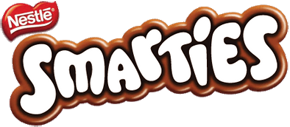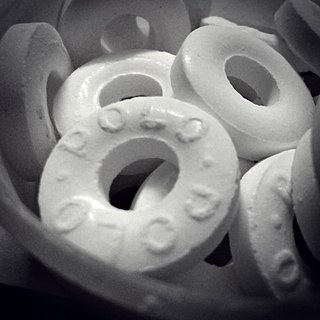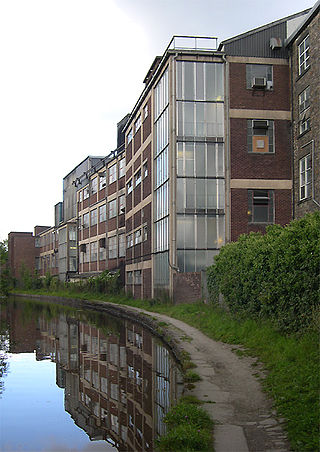
Confectionery is the art of making confections, or sweet foods. Confections are items that are rich in sugar and carbohydrates although exact definitions are difficult. In general, however, confections are divided into two broad and somewhat overlapping categories: bakers' confections and sugar confections.

Jelly Babies are a type of soft sugar jelly sweets in the shape of plump babies, sold in a variety of colours. They were first manufactured in Lancashire, England, in the nineteenth century. Their popularity waned before being revived by Bassett's of Sheffield in Yorkshire, who began mass-producing Jelly Babies in 1918.

Spangles was a brand of boiled sweets manufactured by Mars Ltd in the United Kingdom from 1950 to the early 1980s. They were sold in a paper packet with individual sweets originally unwrapped but later cellophane wrapped. They were distinguished by their shape which was a rounded square with a circular depression on each face.

Smarties are dragée chocolate confectionery. They have been manufactured since 1937, originally by H.I. Rowntree & Company in the United Kingdom, and now by Nestlé.

Polo is a brand of breath mint whose defining feature is the hole in the middle. The peppermint flavoured Polo was first manufactured in the United Kingdom in 1948, by employee John Bargewell at the Rowntree's Factory, York, and a range of flavours followed. The name may derive from "polar", referencing the cool, fresh taste of the mint. Polo mints are also sold in other countries such as India and Sri Lanka by Nestlé. Polo mints are usually sold in a 34g pack containing 23 individual mints.

Jaffa Cakes are a cake introduced by McVitie and Price in the UK in 1927 and named after Jaffa oranges. The most common form of Jaffa cakes are circular, 2+1⁄8 inches (54 mm) in diameter and have three layers: a Genoise sponge base, a layer of orange flavoured jam and a coating of chocolate. Each cake is 46 calories. Jaffa Cakes are also available as bars or in small packs, and in larger and smaller sizes. The original Jaffa Cakes now come in packs of 10, 20, 30, or 40, having been downsized in 2017 from 12 or 24 per pack.

Aero is an aerated chocolate bar manufactured by the Vevey-based company Nestlé. Originally produced by Rowntree's, Aero bars were introduced in 1935 to the North of England as the "new chocolate". By the end of that year, it had proved sufficiently popular with consumers that sales were extended throughout the United Kingdom.

The Smith's Snackfood Company is a British-Australian snack food brand owned by the American multinational food, snack, and beverage corporation PepsiCo. It is best known for its brand of potato crisps. The company was founded by Frank Smith and Jim Viney in the United Kingdom in 1920 as Smith's Potato Crisps Ltd, originally packaging a twist of salt with its crisps in greaseproof paper bags which were sold around London. The dominant brand in the UK until the 1960s when Golden Wonder took over with Cheese & Onion, Smith's countered by creating Salt & Vinegar flavour which was launched nationally in 1967.

Parma Violets are a British violet-flavoured tablet confectionery manufactured by the Derbyshire company Swizzels Matlow, named after the Parma violet variety of the flower. The sweets are hard, biconcave discs, similar to the Fizzers product from the same company but without their fizziness. Swizzels Matlow have also released a line of Giant Parma Violets.

Quality Street is a line of tinned and boxed toffees, chocolates and sweets, first manufactured in 1936 by Mackintosh's in Halifax, West Yorkshire, England. It was named after J. M. Barrie's play Quality Street. Since 1988, the confectionery has been produced by Nestlé. Quality Street has long been a competitor to Cadbury Roses, which were launched by Cadbury in 1938.

Rowntree's Fruit Pastilles are small round sweets measuring about 1.5 cm (0.6 in) in diameter; they have a jelly-like consistency, and are covered with sugar. They contain fruit juice, have no artificial colours or flavours, and come in five flavours: lemon (yellow), lime (green), strawberry (red), blackcurrant (purple) and orange (orange).
Chewits is the brand name of a cuboid-shaped, soft chewy candy manufactured by Cloetta.
Parle Agro Private Limited is an Indian company that owns Frooti, Appy Fizz, LMN, Hippo, Bailley and Smoodh brands.

Double Dip is a confectionery produced by Swizzels Matlow, where it has been popular in the United Kingdom, Australia and Germany. Towards the end of the 1980s Double Dip hit its peak of popularity when the sherbet based confection became the best selling sweet in Ireland.

Swizzels Matlow Limited, branded as Swizzels, is a confectionery manufacturer based in New Mills, Derbyshire.

Percy Pig is a British brand of pig-shaped gummy raspberry, strawberry, cherry and grape-flavoured confectionery products made under licence in Germany by Katjes for Marks & Spencer which first appeared in stores in 1992. More than £10 million was grossed between June 2009 and 2010 in Percy Pig sales in Marks & Spencer's UK branches alone. They contain just under 3.5% fruit juice and since May 2022 have been suitable for vegans.

Midget Gems are chewy, firm sweets similar to wine gums but much harder. They are manufactured from sugar and glucose syrup, corn starch and/or various other starches, animal gelatin, and various colourings and flavouring.

Sherbet is a fizzy, sweet powder, usually eaten by dipping a lollipop or liquorice, using a small spoon, or licking it from a finger.

Barratt is a confectionery brand in the United Kingdom, known for products including DipDab, Refreshers, Sherbet Fountain, Fruit Salad, Black Jack and Wham.




















